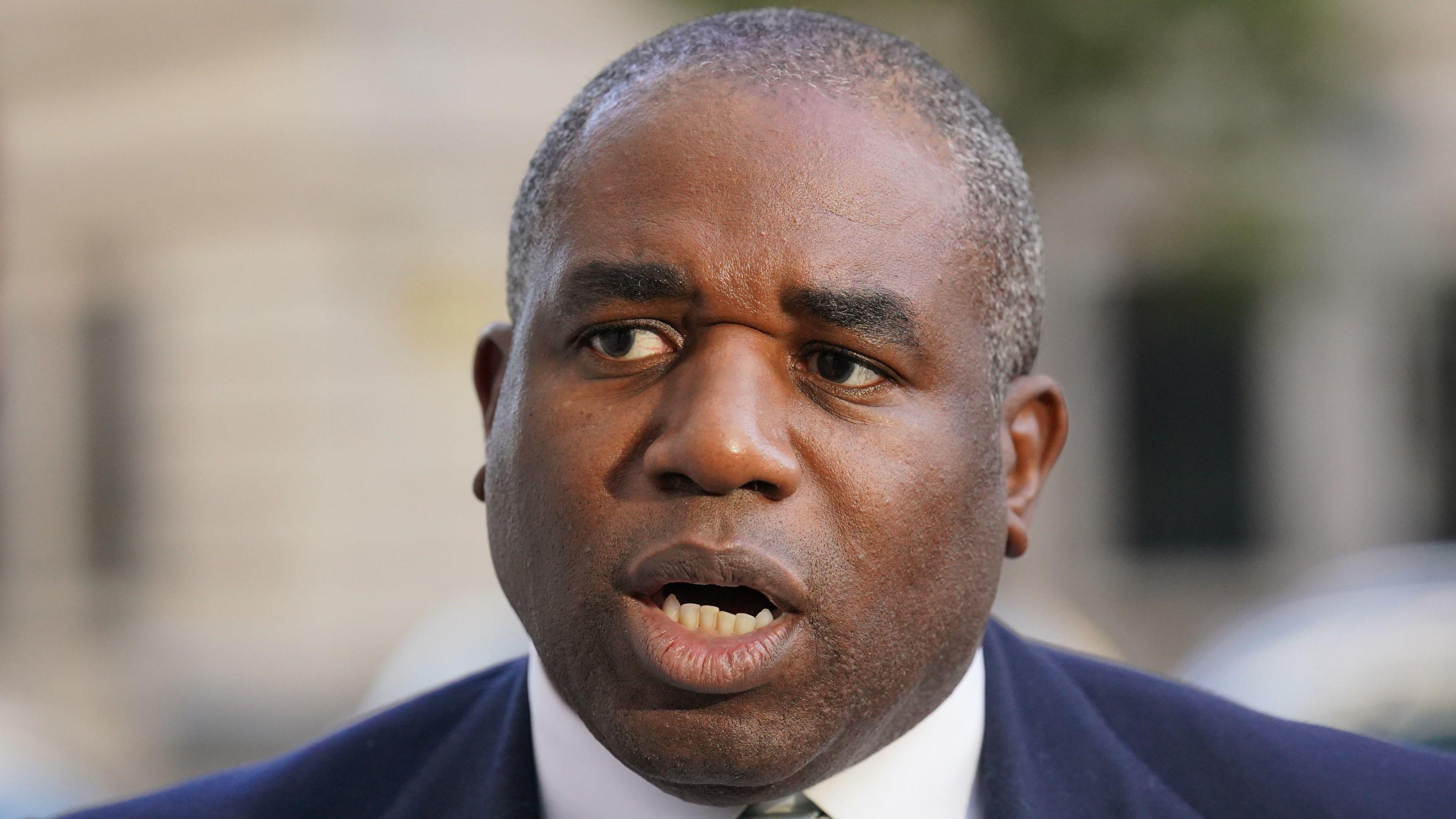David Lammy rejects call to label Trump racist

- Published
Labour's shadow foreign secretary David Lammy has rejected calls to label former US President Donald Trump "racist", insisting Labour would work with whoever occupies the White House.
Mayor of London Sadiq Khan has urged Labour leaders to end a Republican charm offensive and call Mr Trump out as a "sexist" and "a homophobe."
David Lammy has previously called Mr Trump a "neo-Nazi sympathising sociopath".
But he has changed his tone in recent months and on Friday said he would find "common cause" with the de-facto Republican nominee for president.
- Published9 May
- Published11 May
Mr Lammy highlighted past instances where Labour prime ministers had worked with Republican US presidents, citing Harold Wilson and Richard Nixon, Tony Blair and George Bush.
"Whoever is in the White House, or Number 10, in a big election year we must work together," he said during a speech at the Institute for Government.
"The special relationship between the United Kingdom and our American friends is core not just to our own national security, but the security of much of the world," Mr Lammy said - citing the need for international cooperation in wars in Ukraine and Gaza.
During a goodwill mission to the US last week, Mr Lammy reportedly met Mr Trump's campaign manager Chris LaCivita - in what is believed to be the first official contact between Labour and the former president in the run-up to the 2024 US election.
As Labour's spokesman on foreign affairs, Mr Lammy is seeking to forge closer ties with both major US parties, to prepare for power if his party -which is well ahead in the opinion polls - wins the UK general election later this year.
In a speech last week at a Republican think tank in Washington, Mr Lammy said Mr Trump was "often misunderstood" over his commitment to European security.
On Friday, Mr Lammy returned to this argument - saying Mr Trump has "the right concern" about defence spending.
He pointed out under Mr Trump US and European Nato contributions increase and the first American Javelin missiles to Ukraine were delivered.
But Labour's London Mayor Mr Khan said in an interview this week that Mr Trump was "not misunderstood", adding: "He's a racist. He's a sexist. He's a homophobe.
"And it's very important, particularly when you've got a special relationship, that you treat them as a best mate.
"If my best mate was a racist, or a sexist or a homophobe, I'd call him out and I'd explain to him why those views are wrong."
Donlad Trump is the expected Republican candidate for president
Mr Khan and Mr Trump have repeatedly clashed, notably during Mr Trump's presidency.
Mr Trump first criticised the mayor in 2016 for his response to the London Bridge terror attacks.
Then during a visit to the UK in 2019 he called Mr Khan a "stone cold loser" who had failed to manage crime rates in the capital.
In 2022, Mr Khan said that Mr Trump's period as US president led to a significant rise in racial abuse directed at him.
Mr Lammy acknowledged that had previously criticised Mr Trump and the nature of his past presidency.
But he pointed out that almost every politician has had something to say about the former US president, including Foreign Secretary David Cameron who called Mr Trump "xenophobic and misogynistic" in his autobiography.
'Remote and elitist'
Despite this, Mr Lammy stressed the need for strategic cooperation.
"I take very seriously the responsibility of finding common cause on behalf of the national interests of this country," he said.
In a robust critique of the department he hopes to lead, Mr Lammy argued that Foreign Office must lose its reputation for being "remote and elitist".
Mr Lammy said: "For too long, the Foreign Office has been seen by the outside world and the rest of government as generalist dilettantes".
He claimed Britain "has lost influence over international decision-making" during 14 years of Conservative government.
The UK's foreign policy institutions, soft power and international sectors had in suffered from "at best a lack of focus, and at worst political delinquency", he added.